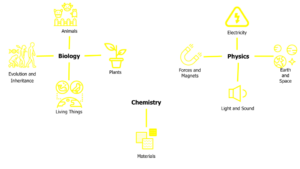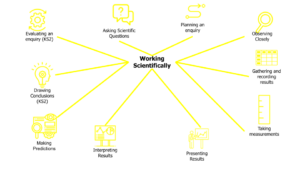Science
Science is a vibrant subject at Portway about which we are incredibly passionate, working towards achieving the Primary Science Outreach Quality Mark. Children have lots of questions about the world around us and we aim to provide them with the necessary core scientific knowledge and investigative skills to answer their questions about those processes. Our curriculum provides a rich variety of topics that cover all the core scientific disciplines and contexts that the children can relate to their everyday lives building on their Science Capital. We aim to give all children the skills and tools to become lifelong scientists.
Our Science Curriculum develops essential characteristics of scientists:
- The ability to think independently and raise questions about working scientifically and the knowledge and skills that it brings.
- Confidence and competence in the full range of practical skills, taking the initiative in, for example, planning and carrying out scientific investigations.
- Excellent scientific knowledge and understanding which is demonstrated in written and verbal explanations, solving challenging problems and reporting scientific findings.
- High levels of originality, imagination or innovation in the application of skills.
- The ability to undertake practical work in a variety of contexts, including fieldwork.
- A passion for science and its application in past, present and future technologies.
Our science unit coverage provides detailed information as to how we teach all elements of the curriculum.
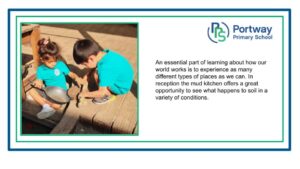
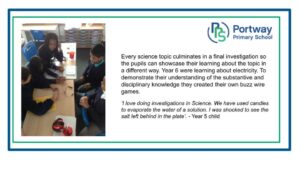
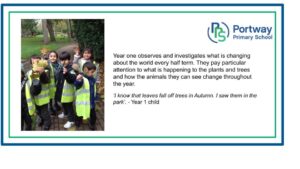
How is science taught at Portway?
The Science curriculum is designed to help children form a Science scheme within their long-term memories.
Schema theory states that all knowledge is organised into units. Amental model is, therefore, a conceptual system for understanding knowledge.
Our Science mental model is a way of organising Science substantive and disciplinary knowledge in a meaningful way; it is an appreciation of how facts are connected and the ways in which they are connected. It is distinct from information, which is just isolated facts that have no organisational basis or links.
Big Ideas help form the basis of the mental model. Big Ideas are key concepts that underpin the subject. There are four Big Ideas in Science:
- Working Scientifically (Planning and carrying out scientific enquiries)
- Chemistry (Becoming familiar with a range of materials, their properties, uses and how they may be altered or changed)
- Biology (Understanding living organisms structure, adaptations and environment)
- Physics (Understanding how energy, forces and matter in space and time relate to each other)
Each Big Idea has knowledge strands which help to strengthen the mental model. Learning knowledge in each of the strands allows pupils to express and demonstrate their understanding of the Big Idea, which gradually develops as pupils return to them over and over again.
